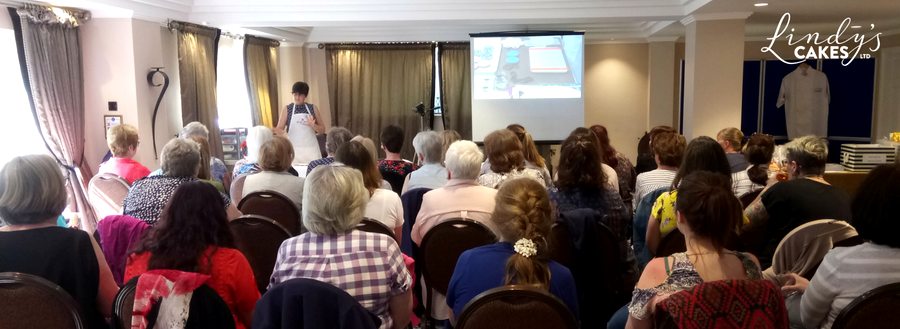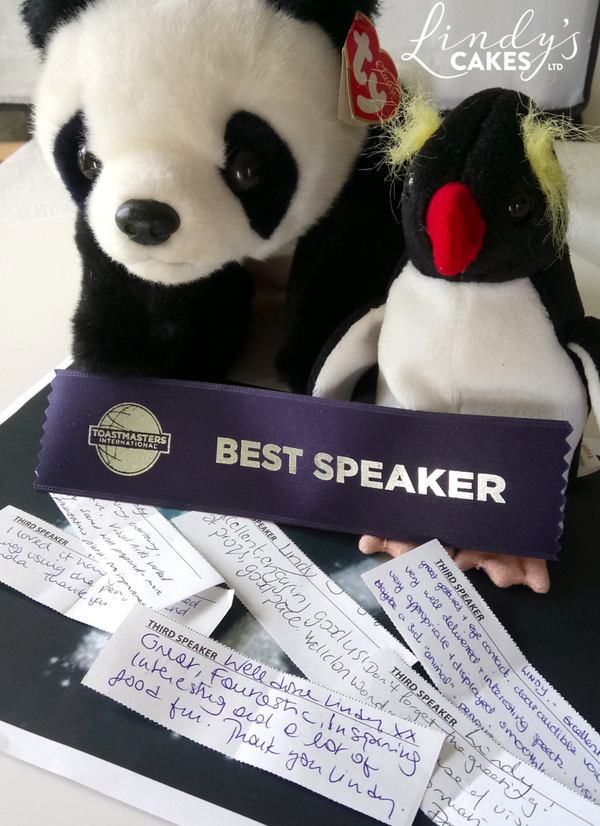Searching for answers is part of the human condition. We are constantly searching for answers…answers to satisfy our curiosity, to help us improve and solve our problems. Answers that make our lives easier and more fulfilled. Answers that help us enrich the world in which we live etc.
As an author and cake decorator, I love to share, inspire and bring happiness into other people’s lives. I was trained as a British Sugarcraft Guild demonstrator back in 2000 and have been demonstrating my craft to audiences around the world ever since. I am constantly honing my presentation skills by learning from and engaging with my audiences. However, I know that it’s all too easy to become complacent, to keep doing what you’ve always done and to take the line of least resistance.

A few years ago, I had an experience that taught me a valuable lesson. I was invited to give an inspirational speech, on International Women’s Day. As always, I was well prepared but something happened that day! I completely dried up…I found it almost impossible to speak! It was a terrifying and extremely embarrassing experience, one that has stayed with me ever since. Luckily soon after this ‘not to be repeated’ experience, I discovered Toastmasters. I quickly realised, that whilst I was still searching for answers, Toastmasters was definitely exactly what needed to improve my speech and stagecraft.
In the last couple of years, like all Toastmasters, I have been on an exciting extraordinary journey of discovery. I have learnt a huge amount and in doing so have found answers to many questions. Below I share with you the transcript of my recent Searching for Answers… speech. A speech I’m very proud off as I won the best speaker of the evening award!

Searching for Answers – Toastmasters award-winning speech
Do you know the answer to the ultimate question of Life the universe and everything? Are you old enough to remember? 40 years ago BBC Radio 4 broadcast a comedy science fiction series that was so popular it became a book…in fact a series of books, a TV series, a video game and then a film. The series in question was called the ‘Hitchhikers guide to the galaxy’. In the guide, the answer to the ultimate question was calculated by an enormous supercomputer called ‘Deep Thought’ over the period of 7.5 million years. His answer to this ultimate question was 42!
Technology is changing the way we search
Back in 1978, if we were searching for answers to our questions it usually meant a trip to the library. Today if we want to know the answer to anything…it’s at our fingertips in an instant. Who do we ask? We ask Google…

Google is seen as the font of all knowledge, the gold standard search engine. But do you usually find what you are searching for? Do you discover those fascinating facts or articles you want to read? In my experience sometimes yes, sometimes no!
Google 1998 – 2018
Google has been in existence for twenty years and amazingly now handles 5.5 billion searches per day. Of these searches around 15 percent are entirely new, never asked before searches. Google tries to answer these by producing results from billions of pages from across the web. In my experience sometimes Google gets it right and sometimes not.
Google search algorithms
As a website owner, I want my website to appear in every search relevant to my industry…but the problem is, so does everyone else! How does Google decide? Google decides by using a complex algorithm – a mathematical process for example, if x=y go to B. It’s not quite so simple for Google as it’s algorithm takes into account 200+ factors. Google is very secretive and doesn’t let people know what these factors are. However, through a combination of research, testing and experience, SEO (Search Engine Optimization) experts believe they know what is important, they have even given some of the parts of the algorithms names. Let me introduce you to:
The Penguin Algorithm – links
Penguin is all about links. A link is like a vote and if a well-respected site, for example, if a government organisation links to a webpage then in Googles eyes it adds trust. The converse is also true if Google sees spammy low-quality links pointing to a site, that site may get demoted. I think you’ll agree this sounds fair, however, it is hard to control who links and how they link. When I tested this website for links last week I actually have both ends of the spectrum linking to me.
The Panda Algorithm – the quality of information
No one really knows all of the factors that Google uses in determining the quality of a website through the eyes of Panda. Ultimately though, the focus is on creating the best user experience “ the distance from perfect” if you like.
• Would you be comfortable giving your credit card information to this site?
• Is this the sort of page you’d want to bookmark, share with a friend, or recommend?
• Would you expect to see this article in a printed magazine, encyclopaedia or book?
• Does the website contain, thin content, duplicate content or low-quality content?
• Does this article have spelling, stylistic, or factual errors?
Mobile friendly
Google doesn’t keep everything secret. It currently wants webpages to be fast and mobile friendly. The mobile-friendly algorithm, which some are calling Mobilegeddon, is having a big impact on searches. Let me explain the difference between the different type of pages:
• A static page where nothing moves like an old-fashioned book.
• A responsive page where the content reduces in size to fit the width of your screen.
• A fully mobile page where content moves to fit the screen. Content concertinas down the page and so everything remains readable.
Currently, Google has two search indexes one for desktop and one for mobile, however, they are soon to be combined so the mobile version of a page will be indexed first!
Why does this matter to you?
I think it matters because there is a lot of fascinating content out there. However, many small companies and individuals can’t afford the time and resources to implement all the changes that Google constantly dictates. So when you are searching I would urge you to bear this in mind. Just because webpages are fast and mobile friendly doesn’t mean they give you the answer you are searching for. I will give you an example. I have an old blog post called ‘Birthday cakes around the world’ and in it, I link to Kaci Daugherty’s blog about ‘Food Cultures of Birthday Celebrations’. Kaci’s blog article was written in 2009. It makes fascinating reading and is well researched with references, however, it doesn’t conform to modern web standards. Consequently, it is nowhere to be seen in search results!
Going back to ‘Deep Thought’ and the answer ’42’ – Did you know?
• Queen Victoria had 42 grandchildren.
• There are 42 laws of cricket.
• Alice’s Adventures in Wonderland has 42 illustrations.
• Harry Potter discovers he’s a wizard on page 42 of Harry Potters and the Philosopher’s Stone.
• Elvis Presley died at the age of 42.
• The Titanic was travelling at 42km/m when it collided with the iceberg.

Winning a Toastmaster’s best speaker ribbon for this speech was very special, thank you to everyone who voted for me.
I hope my speech has inspired you too and that your searching for answers is fruitful.
Sweet wishes
Lindy


